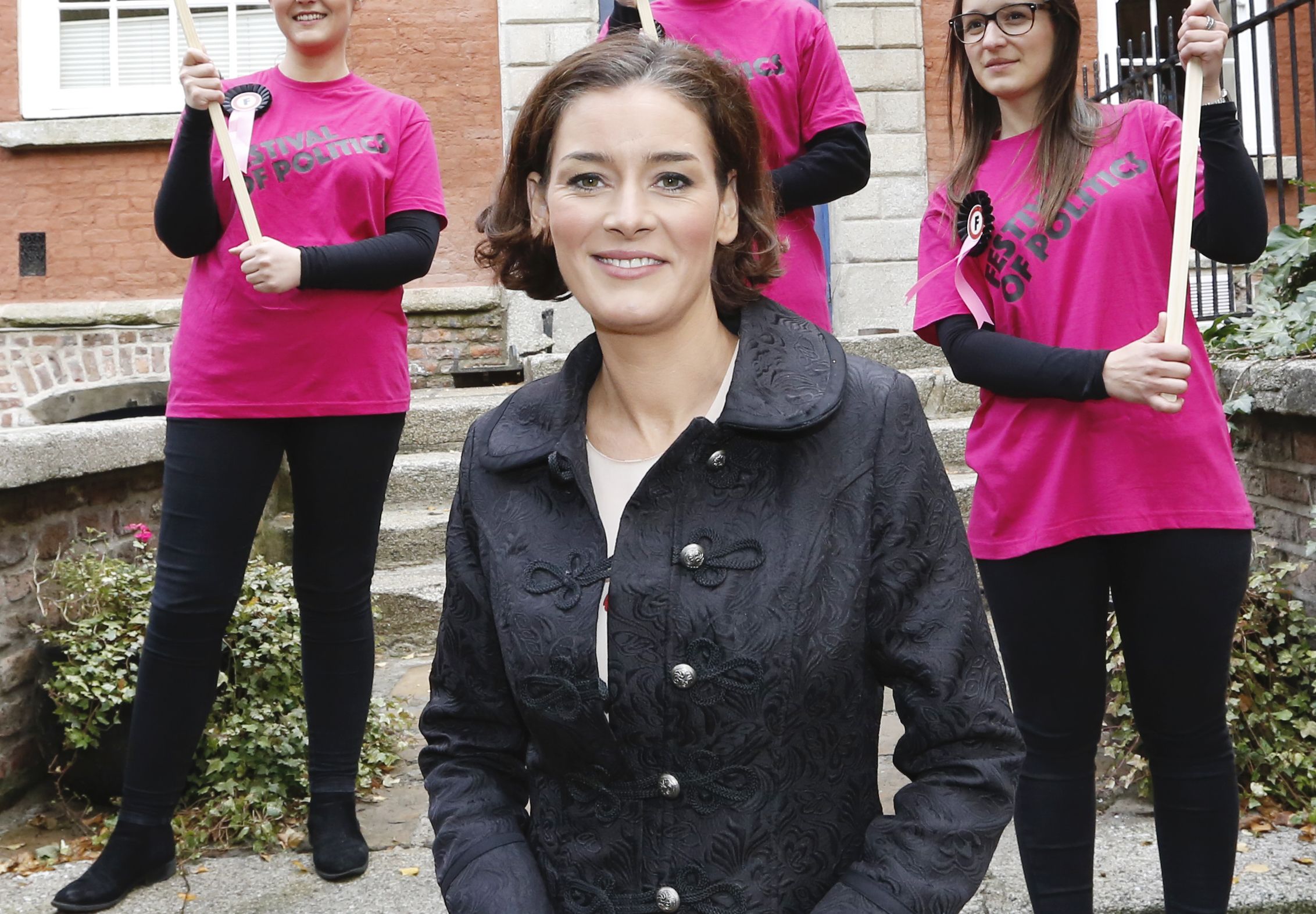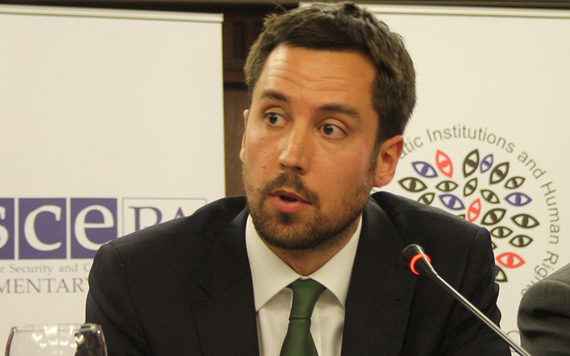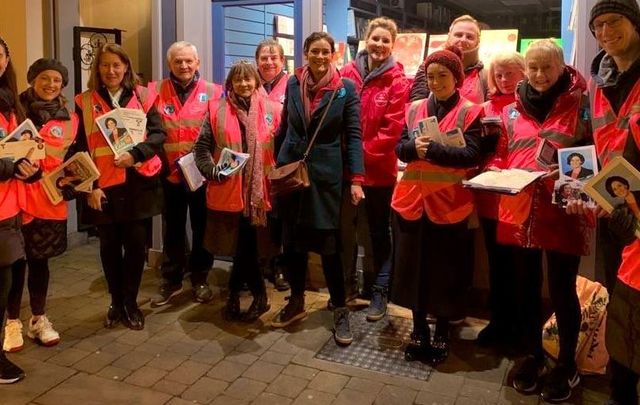A night of house-to-house campaigning with Dublin South's Kate O'Connell show dogged determination from canvassers, vitriol against Fine Gael and about the housing crisis and that every vote counts.
It is six o’clock on a frosty Wednesday evening and a group of people clad in luminous pink has gathered outside a Dublin supermarket. They have been doing so every night for the past two weeks.
The reason for this somewhat unusual gathering is to mobilize support for Kate O’Connell, a local politician running in the upcoming Irish General Election.
O’Connell, a member of the governing Fine Gael party, first won a seat in the Irish Dáil (parliament) in 2016 and is fighting furiously to retain her seat.
That fight is almost entirely being fought by door-to-door canvassing, the most significant part of any Irish election campaign.
Far removed from the big-budget presidential campaigns in the United States, canvassing is grounded in the work of volunteers and dogged determination.
Faith in political canvassing is well-founded. Research from the French presidential elections found that canvassing influenced voter share by as much as 3.14% - a hugely significant amount in a tight political race.
While O'Connell also holds coffee mornings and meet and greets in local supermarkets, it is canvassing that forms the backbone of her campaign, like so many other candidates across the country.
It is why this motley crew of young and old canvassers can be found every night, awaiting their instructions in the freezing cold.
Some of the team out on the doors with me last night in Sandymount -they’re a great bunch, ranging in age from 19 to late 60s, men & women from all over the country who live and care about their communities and their futures.
Feel very lucky to have them all out on the doors ? pic.twitter.com/SPsgQaHDlk
— Kate O'Connell TD (@campaignforkate) January 28, 2020
The group has been campaigning in different areas in the Dublin Bay South constituency since the general election was called on Jan 14. and they will continue to campaign until Friday, Feb. 7 - one day before the election. They only stop due to the 24-hour moratorium in place by Irish law.
The group sets forth from the supermarket and begins the process of knocking on as many doors as they possibly can.
Theresa Newman, political strategist for Kate O’Connell, says that they try to reach 500 houses each night as a rough target, but that they “keep going until Kate physically can’t anymore.”
There is a structured approach to the canvassing. Pink-clad volunteers approach houses in groups of twos while O’Connell hangs back on the street.
If the canvassers are successful and grab the attention of the unsuspecting homeowner, O’Connell darts forward to greet them.

Fine Gael TD, Kate O'Connell.
“People like to meet Kate,” Newman explains.
When O’Connell finishes making her case to one household, she is generally beckoned forward by another canvasser who has made a successful house call. The hopeful candidate hurries along to the next house in a bid to secure another vote. It’s easy to see how this process takes its toll on an aspiring politician.
It is tough, but O'Connell has seen tougher. She gave birth just months before the last general election in 2016 and admits that the strain of door-to-door canvassing very nearly took its toll on her, saying that was close to collapsing on the street.
As is to be expected with any door-to-door campaign, there is a large portion of no thank yous, no answers, or just plain vitriol.
Read more: Refusal to accept Sinn Fein in Irish government complete hypocrisy
O’Connell is part of an unpopular governing party and, as such, is subject to her fair share of criticism, but she continues forward, unwavering and unabashed.
One such instance sees O’Connell dart forward to consult a constituent about the hospital crisis, only for the constituent to proclaim that “didn’t want to talk about it” because they were that frustrated before closing the door in her face with a snap.
One disgruntled resident is particularly unhappy about the housing crisis in Ireland that has seen rent prices, housing prices and homelessness all shoot up during the last four years of government. Undeterred, O’Connell greets her in the same manner as she has greeted every other constituent.
Pleading her case, she pledges that Fine Gael will build more houses year on year to tackle the growing crisis. When the resident still doesn’t appear convinced, O’Connell spends an unusually long time convincing her that she is the right candidate for the area. Votes are that important.
Ireland's housing crisis
The housing crisis is of particular relevance to O’Connell’s campaign. She shares a constituency with fellow Fine Gael member Eoghan Murphy, the incumbent Irish Housing Minister, who many voters regard as responsible for the current state of affairs.
As such, O’Connell has to field several questions that would be best directed to her colleague but she perseveres and tries to direct attention to areas that she has worked on over the past four years, notably the environment and mental health.
“It’s his job and I’m not here to answer for it,” she says.
Irish politics is unusual in the sense that more than one candidate from the same party will run in the same, multi-seat district and it creates a delicate balancing act between trying to secure your own vote and trying to promote your colleague.
O’Connell describes it as “awkward” and says that there is a prerequisite for coordination between her campaign team and Eoghan Murphy’s team to ensure that they don’t canvas the same area on the same night.

Current Housing Minister, Eoghan Murphy.
The much-maligned Housing Minister has created a degree of animosity in what is an affluent area and O’Connell can see why.
“People are upset [about the housing crisis] because they’re human beings and they care,” O’Connell says.
Every vote counts
But for every negative house call, there is a positive one.
At one door, O’Connell is greeted warmly by a woman who professes her support for Fine Gael. As O’Connell retreats down the garden path, the woman calls after her: “I’m definitely voting for you.”
Some houses require a certain type of creative thinking. One instance sees two canvassers do their best to stop a dog's bid for freedom as O'Connell attempts to convince a first-time voter to vote for her on election day. The dog is safely restrained before it can bolt down the front steps and make it to the garden path. The first-time voter assures O'Connell she will think of her on election day. An all-round success.
Another voter pulls up beside the fluorescent group to talk to O’Connell. As she pulls back into traffic, O’Connell tells her that she “would love her vote.”
“Don’t worry, you’ll get it,” came the reply from the car.
In an election set to be decided by the narrowest of margins, each of those votes could be the difference between another term in office and defeat and O’Connell is acutely aware of this.
“Canvassing is more important now than ever before,” she says.
By the time the clock strikes 8:30 p.m., the group decides to turn it in for the night. There is no value in calling on potential voters late at night and potentially upsetting them.
They have easily reached their target of 500 houses, covering over two miles in the process.
Similar campaigns are being carried out all over the country as politicians make a desperate bid to secure crucial votes ahead of one of the most important general elections in recent memory.
Canvassing is the cog that keeps political campaigns turning and an effective canvas can be the difference between a successful campaign and unemployment.
Read more: Polls show tough election 2020 road for Leo Varadkar




Comments